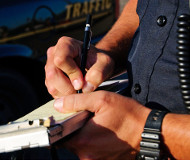1/30/2018
NHTSA Says Federal Law Requires Ticket QuotasNational Highway Traffic Safety Administration rejects effort to eliminate the use of ticket quotas when issuing federal highway grants.

Federal regulators are refusing to budge when it comes to requiring local police forces to use ticket quotas. The National Highway Traffic Safety Administration (NHTSA) on Thursday finalized the procedures local police departments use to receive their share of $450 million in traffic safety grants paid for by the federal tax on gasoline. In response to complaints from the National Motorists Association (NMA), the agency claimed it was powerless to change the way it allocated the funds.
"NHTSA notes that states are not required to submit a target for citations and arrests in the highway safety plan, and in fact, no state submitted a target for violations and arrests in its grant applications," the agency explained in its final rule. "NHTSA makes no change to rule in response to [the NMA's] comment.
The motorist rights group had written to Transportation Secretary Elaine Chao (read letter) citing clear examples of what the group said amounted to de facto ticket quotas. One applicant used a formula creating an "equivalent stops per billable hour" performance metric. In November, the American Civil Liberties Union (ACLU) pointed to internal emails from a Rhode Island police department that illustrated how local officials see the federal requirements as an incentive to implement a ticket quota.
"To qualify for funding, NHTSA requires an annual traffic safety plan from each state that must include statistics on seat-belt citations, impaired driving arrests, and speeding citations issued during grant-funded enforcement activities the previous year," NMA President Gary Biller told TheNewspaper on Monday. "What outcome is expected other than the perpetuation of federally sanctioned ticket quotas?"
Under federal law, the Section 402 grants must be part of a "data driven" enforcement effort "to prevent traffic violations, crashes, and crash fatalities and injuries in areas most at risk for such incidents." Despite the explicit instruction to reduce violations, the law also makes reference to a NHTSA report on traffic safety performance measures that counts the number of citations issued as "activity measures" that can determine how much cash localities receive (view NHTSA report summary in a 500k PDF file). NHTSA officials believe that they cannot deviate from this document.
"The federal statute further requires that highway safety plans be based on performance measures developed by NHTSA and GHSA," the agency explained. "That report includes activity measures related to seat belt citations, impaired driving arrests and speeding citations... NHTSA may not waive these statutory requirements."
The new rule takes effect on February 26. A copy is available in a 3.2mb PDF file at the source link below.


